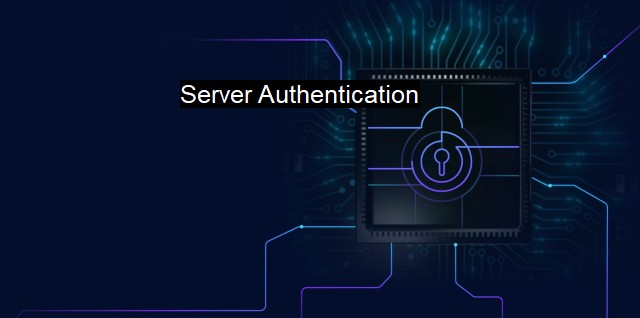What is Server Authentication?
Securing Communication Channels: An Overview of Server Authentication in Cybersecurity and Antivirus
Server Authentication, a core aspect of cybersecurity, is an essential procedure that ensures the safety of data and information shared across different networks and systems. It is a critical practice for confirming that a server is what it claims to be, hence preventing unauthorized access and maintaining the integrity and confidentiality of data.Server Authentication is a process that requires a server to prove its identity to a client. The client will demand authentication from the server, which in turn, will provide the evidence required to prove its identity. This process plays a fundamental role in network security, especially with internet-based systems such as web servers where unauthorized access presents significant risks.
Authentication procedures often rely on cryptographic methods, which include the generation and sharing of keys between server and client for encryption and decryption. The server offers the client a copy of its public key. The client then verifies the server's authenticity using the pre-installed certificate authority (CA) public key. On validating the server’s certificate, the client encrypts a session key with the server’s public key. The server decrypts the session key using the private key, thereby ensuring secure communication.
An effective server authentication shields networks from cyber threats while creating an environment that encourages user trust and a sense of security in information sharing. From standard business operations such as emails, online shopping transactions, or accessing cloud-based services, server authentication plays an integral role ensuring that the server users connect to is genuine and validated.
Server Authentication is particularly crucial in avoided man-in-the-middle (MITM) and phishing attacks. In a typical MITM attack, an attacker impersonates a real server and intercepts communication from the client, thus diverting or manipulating data as it moves from sender to receiver. But if the Authentication is correctly implemented, the client could identify that the server is fake even before the hacker tries to steal realms of information.
Equally important in the context of cybersecurity and antivirus is maintaining up-to-date and robust antivirus software. It plays a complementary role in server authentication by warding off malware attacks and mitigating threats that may leverage server vulnerabilities thereby intercepting the server's legitimacy.
Outdated entities such as SSL/TLS protocols, expired certificates, weak passwords, or keys could be easily targeted by cybercriminals. Therefore, updated antivirus software helps to identify and neutralize these outdated entities, providing optimum protection against these threats before they can exploit any potential vulnerability in the system.
Robust antivirus software, equipped with powerful scanning and detecting capabilities, enables businesses and servers to authenticate or verify whether a file, email or web link is potentially dangerous. Antivirus programs do this by analyzing the context of the said file or link, and deliberately investigating the possible threat it may carry. If it contains potential hazardous elements, the antivirus blocks and combats these malicious threats significantly reducing damage.
Server Authentication is a critical process in the realm of cybersecurity becoming the first line of defense against cyber threats. Antivirus software further enhances this security by tackling latent vulnerabilities which could be potential targets for cyber attackers. Maintaining an authenticated server-side and an updated antivirus protocol empowers business operations to perform securely in a digital work environment offering a fortified layer of protection to the user thereby strengthening the trust relationship between the client and the server.

Server Authentication FAQs
What is server authentication and why is it important in cybersecurity?
Server authentication is the process of verifying the identity of a server to ensure it is legitimate and not a fake or malicious server. It is important in cybersecurity as it helps prevent unauthorized access or attacks on the network, and ensures that sensitive data is only accessed by authorized users.What are some common methods of server authentication?
Some common methods of server authentication include digital certificates, public key infrastructure (PKI), multi-factor authentication (MFA), and secure password protocols.How can I check if a server is authenticated or not?
You can check if a server is authenticated or not by looking for the lock icon in your web browser's address bar, which indicates that the website is secure and has a valid SSL certificate. You can also check the domain name to ensure that it matches the name of the organization or website you are trying to access.What are the risks of using an unauthenticated server or website?
Using an unauthenticated server or website can put your personal and sensitive data at risk of theft or hacking. It may also expose your device to malware or viruses that can compromise its security and infect other devices on the network. It is important to always verify the authenticity of a server or website before accessing it.| | A | | | B | | | C | | | D | | | E | | | F | | | G | | | H | | | I | | | J | | | K | | | L | | | M | |
| | N | | | O | | | P | | | Q | | | R | | | S | | | T | | | U | | | V | | | W | | | X | | | Y | | | Z | |
| | 1 | | | 2 | | | 3 | | | 4 | | | 7 | | | 8 | | |||||||